OCZ Z-Drive R4 CM88 (1.6TB PCIe SSD) Review
by Anand Lal Shimpi on September 27, 2011 2:02 PM EST- Posted in
- Storage
- SSDs
- OCZ
- Z-Drive R4
- PCIe SSD
Random Read/Write Speed
The four corners of SSD performance are as follows: random read, random write, sequential read and sequential write speed. Random accesses are generally small in size, while sequential accesses tend to be larger and thus we have the four Iometer tests we use in all of our reviews.
Our first test writes 4KB in a completely random pattern over an 8GB space of the drive to simulate the sort of random access that you'd see on an OS drive (even this is more stressful than a normal desktop user would see). I perform three concurrent IOs and run the test for 3 minutes. The results reported are in average MB/s over the entire time. We use both standard pseudo randomly generated data for each write as well as fully random data to show you both the maximum and minimum performance offered by SandForce based drives in these tests. The average performance of SF drives will likely be somewhere in between the two values for each drive you see in the graphs. For an understanding of why this matters, read our original SandForce article.
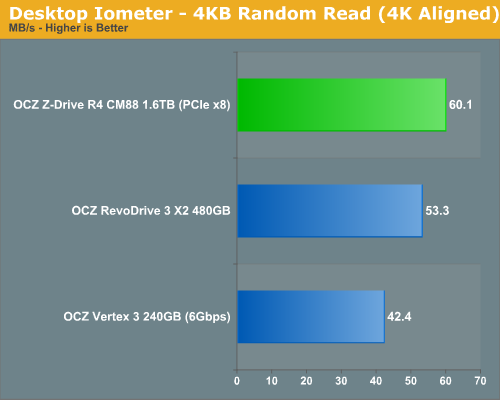
As we saw in our RevoDrive 3 X2 review, low queue depth random read performance doesn't really show much of an advantage on these multi-controller PCIe RAID SSDs. The Z-Drive R4 comes in a little faster than the RevoDrive 3 X2 but not by much at all. Even a single Vertex 3 does just fine here.
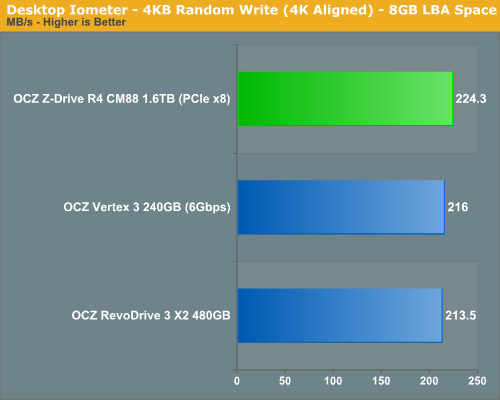
Random write performance tells a similar story, at such low queue depths most of the controllers aren't doing any work at all. Let's see what happens when we start ramping up queue depth however:
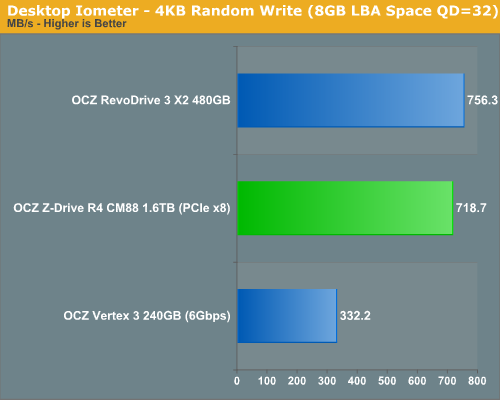
Surprisingly enough, even at a queue depth of 32 the Z-Drive R4 is no faster than the RevoDrive 3 X2. In fact, it's a bit slower (presumably due to the extra overhead of having to split the workload between 8 controllers vs just 4). In our RevoDrive review we ran a third random write test with two QD=32 threads in parallel, it's here that we can start to see a difference between these drives:
It's only at ultra high queue depths that the Z-Drive can begin to distance itself from the RevoDrive 3 X2. It looks like we may need some really stressful tests to tax this thing. The chart below represents the same data as above but in IOPS instead of MB/s:
271K IOPS...not bad.


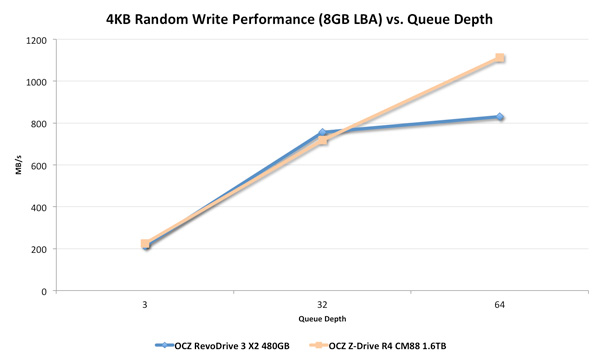
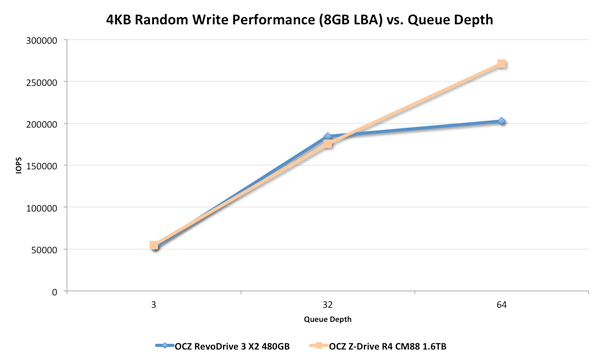








57 Comments
View All Comments
geddarkstorm - Wednesday, September 28, 2011 - link
^ Thiscervantesmx - Wednesday, September 28, 2011 - link
I agree 100%GTRagnarok - Tuesday, September 27, 2011 - link
"We have a preproduction board that has a number of stability & compatibility OCZ tells us will be addressed..."I think a word is missing here.
icrf - Tuesday, September 27, 2011 - link
Also, you missed the protocol on the last link on the first page (the one to ssd bench) and it 404's nowAnand Lal Shimpi - Tuesday, September 27, 2011 - link
Fixed both! Thank you!Take care,
Anand
FATCamaro - Tuesday, September 27, 2011 - link
OOH OOH Let me guess!!!Never??
As in :
"We have a preproduction board that has a number of stability & compatibility OCZ tells us will NEVER be addressed..."
vodkapls - Tuesday, September 27, 2011 - link
Isn't it the fact that the revodrive 3 x2 use asynchronous memory that makes it so much slower than the r4 ?Anand Lal Shimpi - Tuesday, September 27, 2011 - link
Great catch! I hadn't even thought of that but it's definitely a possibility :)Take care,
Anand
jebo - Tuesday, September 27, 2011 - link
I just can't take OCZ seriously from a reliability standpoint. I would love to know what the failure rate is like on OCZ's desktop offerings. I personally am in the process of my 3rd RMA of an OCZ SSD during the past 2 years.I think Intel, Crucial (or, judging by the last review, Samsung) will make my next SSD. I can only rebuild windows and piece together backups so many times before I say enough is enough.
dilidolo - Tuesday, September 27, 2011 - link
What's the point to develop enterprise product if no enterprise is going to buy?I don't think any enterprise will trust OCZ.